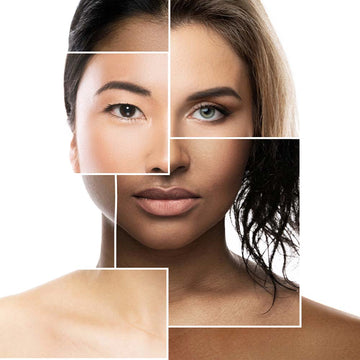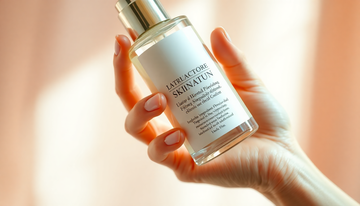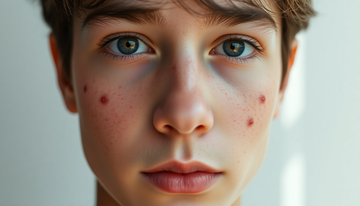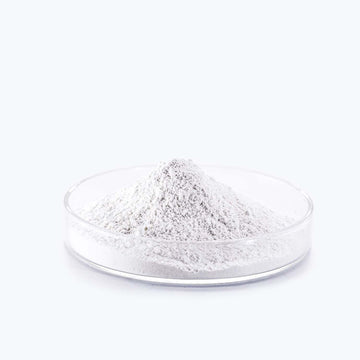No matter what skin type you have, everyone can benefit from a daily, skincare routine that is tailored to their needs. Knowing what is my skin type is essential to adopting the right skincare regimen for your skin type. Sometimes, our skin type doesn't fit into a single category; it may fall into a few different categories, or it may vary depending on the time of year, external factors, and lifestyle changes. So, what is your skin type? Read on to learn more about different skin types and how to care for your skin the right way using our skin type test!
What type of skin do I have?
All types of skin have different needs. From oily skin to dry skin, normal skin to combination skin and sensitive skin, everyone has different needs. So, how do you know your skin type? The answer is simple:
Identifying Skin Types: A Detailed Breakdown
1.Oily Skin
Care Tips:
b.Opt for oil-free, non-comedogenic moisturizers.
c.Incorporate targeted treatments for acne-prone areas.
2. Dry Skin

Characteristics: Dull and flaky appearance, tightness, roughness, fine lines.Dry skin lacks moisture and lipids, making it less elastic and more prone to irritation. It may react quickly to environmental influences like sunlight or wind, leading to discomfort. Restorative and hydration creams can help replenish moisture stores and strengthen the skin's protective barriers.
Care Tips:
a.Use gentle, hydrating moisturizers enriched with natural oils.
b.Drink at least 2 liters of water daily for internal hydration.
c.Include serums with ingredients like hyaluronic acid.
3. Normal Skin

for its healthy appearance.
Care Tips:
a.Use a micellar face wash for freshness.
b.Gently exfoliate to remove impurities.
c.Choose a light day cream with added SPF.
4. Combination Skin

Care Tips:
a.Begin with a delicate cleanser.
b.Use oil-free moisturizer, focusing on drier areas.
c.Consider products designed for combination skin.
5. Sensitive Skin

Sensitive skin is prone to reactions from stress, environmental factors, and certain products. It requires extra care to soothe and strengthen its barriers. Fragrance-free and gentle products are essential to prevent irritation.
Care Tips:
a.Choose a protective cream against environmental influences.
b.Use SPF-containing day cream, especially on sunny days.
c.Avoid fragranced products and hot spices in your diet.
6. Mature Skin

Care Tips:
a.Prioritize sun protection with SPF-containing products.
b.Adopt a skincare routine that supports cell regeneration.
c.Use a specialized eye care cream for delicate areas.
How to Identify Your Skin Type at Home
If you're unsure of your skin type, two simple tests can provide clarity:
The "Watch and Wait" Method:
1.Wash your face with a gentle cleansers.2.Wait 30 minutes and observe:
The Blotting Sheet Method:
1.Wash your face and wait 30 minutes.2.Press blotting sheets on different areas:
b.Little to no oil absorption indicates dry skin.
c.Minimal oil in the T-zone signals combination skin.
d.Minimal oil overall suggests normal skin.
To know more click here.
Frequently Asked Questions (FAQs)
1. Why is it important to know my skin type?
Understanding your skin type is crucial for creating an effective skincare routine that addresses your specific needs and concerns.
2. Can my skin type change with the seasons?
Yes, factors like weather, humidity, and temperature can impact your skin type, making it essential to adapt your skincare routine accordingly.
3. What are the key characteristics of oily skin?
Oily skin is characterized by excess sebum production, leading to a shiny appearance, especially in the T-zone. It is often prone to enlarged pores, acne, blackheads, and whiteheads.
4. How can I care for my dry skin?
Dry skin, which may appear dull and flaky, requires hydrating moisturizers with natural oils, increased water intake, and the inclusion of serums containing ingredients like hyaluronic acid.
5. Is a regular skincare routine necessary for normal skin?
Absolutely. Even normal skin benefits from a consistent routine, including a gentle face wash, regular exfoliation, and the use of a light day cream with added SPF.
6. What characterizes combination skin?
Combination skin exhibits both oily and dry areas, often with an oily T-zone and drier cheeks. Balancing these areas with specific products is key to a harmonized skincare routine.
7. How can I care for sensitive skin?
Sensitive skin, prone to reactions, requires extra care. Choose protective creams, SPF-containing day creams, and avoid fragranced products and certain dietary elements like hot spices.
8. What changes occur in mature skin, and how can I care for it?
Mature skin is less elastic, with visible lines and reduced moisture. Sun protection, anti-aging products, and specialized eye care creams are crucial for maintaining skin health.
9. Can stress impact my skin type?
Yes, stress can affect your skin, making it more susceptible to reactions. Managing stress is an integral part of overall skincare.
10. How accurate are at-home tests for identifying skin types?
At-home tests like the "Watch and Wait" and the "Blotting Sheet" methods can provide a general understanding of your skin type. However, for personalized advice, consulting a dermatologist is recommended.





